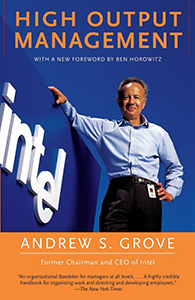High Output Management
“High Output Management” by Andrew S. Grove is a classic management book that provides practical insights and strategies for improving productivity and effectiveness in organizations. Grove, a former CEO of Intel, offers his expertise on management principles based on his extensive experience in leading one of the world’s most successful semiconductor companies. Here’s a summary of the key concepts and themes covered in the book:
Key Concepts:
1. Managerial Leverage:
– Grove emphasizes the concept of managerial leverage, which involves maximizing the output of a team through effective management techniques. He discusses how managers can leverage their time and efforts to achieve greater results by focusing on activities that have the highest impact.
2. Management by Objectives (MBO):
– Grove introduces the concept of MBO, where managers and their teams set clear objectives and key results (OKRs) to guide their work. He explains how setting and communicating objectives helps align everyone towards common goals and encourages accountability and performance.
3. Operational Transparency:
– Grove advocates for transparency within organizations, particularly regarding information flow and decision-making processes. He emphasizes the importance of clear communication and ensuring that relevant information is accessible to those who need it to perform their roles effectively.
4. Meetings and Decision Making:
– The book provides practical advice on conducting effective meetings and making decisions efficiently. Grove outlines guidelines for different types of meetings (e.g., one-on-one, staff meetings) and discusses how to ensure that meetings are productive and contribute to achieving organizational goals.
5. Managing Teams and Individuals:
– Grove discusses various aspects of managing teams and individuals, including motivation, performance evaluation, and career development. He emphasizes the role of managers in coaching and developing their team members to maximize their potential and contribution to the organization.
6. Crisis Management:
– Grove also covers strategies for handling crises and managing under uncertainty. He provides insights into proactive crisis management strategies and how to lead teams through challenging situations while maintaining focus and productivity.
Themes:
– Practical Management Techniques: Grove’s approach is highly practical, focusing on actionable strategies that managers can implement to improve their effectiveness and the performance of their teams.
– Data-Driven Decision Making: He advocates for using data and metrics to inform decision-making processes, ensuring that decisions are based on objective information rather than subjective opinions.
– Continuous Improvement: The book promotes a mindset of continuous improvement and adaptation to changes in the business environment. Grove encourages managers to constantly evaluate and refine their management practices to stay relevant and effective.
– Leadership and Accountability: Grove emphasizes the importance of leadership in driving organizational success and creating a culture of accountability where individuals take ownership of their responsibilities.
Conclusion:
“High Output Management” is a seminal work that remains highly relevant for managers at all levels, from frontline supervisors to top executives. Andrew Grove’s insights and principles provide a solid foundation for understanding effective management practices and fostering high-performance teams in today’s dynamic business world. The book’s focus on practicality, transparency, and continuous improvement makes it a valuable resource for anyone looking to enhance their management skills and achieve greater productivity in their organization.

